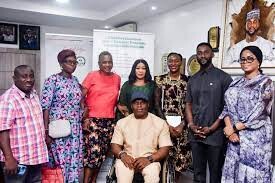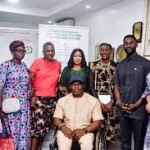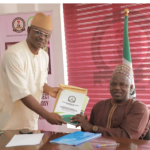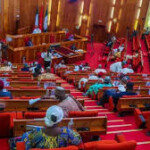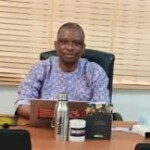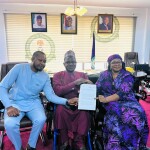With 0.52 percent of his N2.3-tr budget voted for PWDs, Gov. Sanwo-Olu became ambassador of a presidential initiative that rocks like a propagandist machine.
By Gideon Oladimeji
February 2, emissaries of President Bola Tinubu’s Senior Special Assistant on Special Needs and Equal Opportunities Mohammed Abba Isa and others arrived Lagos to launch another presidential initiative on disabilities.
The event had a side show: the appointment of Gov. Babajide Sanwo-Olu, who didn’t show up in person, as ambassador of the initiative.
Sanwo-Olu fits the bill. Going by Isa’s team’s criteria for qualification, Lagos ticked all the six right boxes under the Key Performance Indices (KPIs). One that basically connects them all is Disability-Sensitive Budgeting, across all sectors. The presidential team also considered that Tinubu, disability-friendly as he is, comes from Lagos.
Only Isa’s representative Yusuff Iyodo and Sanwo-Olu’s Youth and Social Development Commissioner Mobolaji Ogunlende took the soapbox. Others present, including LASODA General Manager Adenike Oyetunde-Lawal, were all ears, according to a press statement after the event.
But sometime early March, a spin doctor souped up the stale press release; the ministry’s Permanent Secretary Toyin Oke-Osanyintolu, Oyetunde-Lawal, and others suddenly found their voices alongside Isa and Ogunlende. This time, the Lagos crowd sang their own praises louder, and bossed up their ‘THEME’ agenda.
“The administration of Gov. Babajide Sanwo-Olu has championed the cause of the PWDs by ensuring over 400 of them are absorbed into the state civil service, as well as being given fair share in health and education sectors,” Oyetunde-Lawal said.
The initiative itself—Disability Governors Connect—now took the back seat. This is a policy Isa sold as dear to the president; and it is supposed to “build a national consensus on PWD-friendly policies and environmental conditions” among the states. The National Commission for Persons with Disabilities (NCPWD) will co-ordinate it with Lagos.
The immediate past administration had one proposed to be sensitive to the plight of the PWDs, too. The NASS formulated that—Urgent Need to Provide Special Intervention for PWDs—in May 2021, in the wake of the Covid 19 pandemic. The Senate specifically proposed mass supply of assistive devices, and all MDAs dedicating 10 percent of their projects to disability issues. But the policy died standing up on the floor.
Nothing suggests this Isa’s brainchild will not suffer a stillbirth, too. ER asked the LASODA boss if there was a progress report about Disability Ambassador Sanwo-Olu’s effort to bring other governors on board since February. Adenike didn’t respond.
Her counterpart at the Oyo State Agency for Persons With Disabilities, Ayodele Adekanmbi, didn’t respond either. ER enquired about Gov. Seyi Makinde coming onboard the Disability Governors Connect wagon, and what his plans are for the state’s PWDs.
It’s easy to gauge where many of the governors’ interest lies, and how they can’t help back-fitting disability affairs, no matter their claims to inclusive governance.
No fewer than 20 states have either adopted the Prohibition Act 2018 or enacted their own disability laws; only 10 of them, including Lagos, Oyo, Plateau, Kaduna, Plateau, Abia, Anambra and three others, have so far established their implementing agencies. And without such a body, the other KPIs Isa proposed, including disability-sensitive budgeting, are mere daydreams. Those states whose disability commissions propose budgets cannot even claim much sensitivity to the need of the PWDs.
A case in point is Lagos. Less than one percent of the state’s N2.3-trillion-2024 budget goes directly for disability affairs. Yet Sanwo-Olu continuously wins the most disability-sensitive governor medal.
It’s difficult to ascertain how much each of the MDAs plans for disabilities. But eight projects relate directly to the communities: procurement of assistive devices, teaching aids, entrepreneurial development for PWDs, two on-going care giver institutes under construction; and four others captured under recurrent expenditures, including physically challenged expenses, inclusive spending, teaching aids special education, and inclusive education. They all add up to about N1.2bn. That’s 0.52 percent of the budget—in a state adjudged the most disability-sensitive in Nigeria.
Of those budget items, the state disability office, with just N306 million voted for its entire capital expenditure, is funding two: purchase of teaching and learning aids (N106m) and research and development, R&D (N200m). The latter is captured under budget classification by projects as Entrepreneurship for PWDs. If that wrong capturing is an error, it makes for a smart way to muddle up procurement, and parry questions when it’s time for accountability.
Taken together, more than half of the commission’s approved budget N733m is going for operating/recurrent expenditure. That is N427m for bread and butter. LASODA will be spending N300m of this on special day celebrations. Former GM Dare Dairo was known for his big jamborees, for awarding contracts to illegal companies, and for refusing to account Oyetunde-Lawal kicked off her tenure’s whoopee early in the year. She had to bring the last December Disability Day—and all its spendings—to January this year. More to come.
But in the interim, local training of LASODA’s staffer will gulp N16.8m. They will spend N13m on telephone charges, too, and N62m on special duties. Committees will take N13m, and N3.2m for some physically challenged expenses.
ER asked the GM again about the essence of the N200m-R&D budget item, and how disability-sensitive the entire budget, including LASODA’s, is. She didn’t respond.
More pressing than all these is the need of the Lagos disability community for a database. There is none yet, after more than a decade the commission has been at the helm, despite the Lagos Special People Law express provision (Section 9 subsection 7) for one—to aid proper planning.
The last time Oyetunde-Lawal conjured up the figure of PWDs in Lagos civil service, protest erupted. “She has been employed to blow the trumpet for boss,” a community member said. “They even soon inflate it to over 2000.”
For accessibility, the PWDs point at ramps, as the only features the state always boasts of.
In reality, not much can any government achieve in terms of inclusion with less than one percent of its budget. Many of the PWDs ER have spoken to say Sanwo-Olu, like his predecessor Akinwunmi Ambode, has a heart of gold. But good intentions can only go so far. Disability management is a matter of rights. Not sympathy.
Unfortunately, the Governors Connect Initiative is laying its foundation on politics and goodwill. On the other hand, the Prohibition Act 2018, in its form and substance, provides enough solid ground to mainstream disability in Nigeria. All that matters is the federal government, its MDAs, the disability commission in particular, being willing to obey its own law, and be accountable.
The NCPWD is no better than its Lagos ancestor. It has equally failed in some of the KPIs—disability-sensitive procurement and development plans—of the presidential initiative.
How politics will make up for the two agencies’ lip service, and help coax on-board 35 other governors is going to be a tough job.
.

